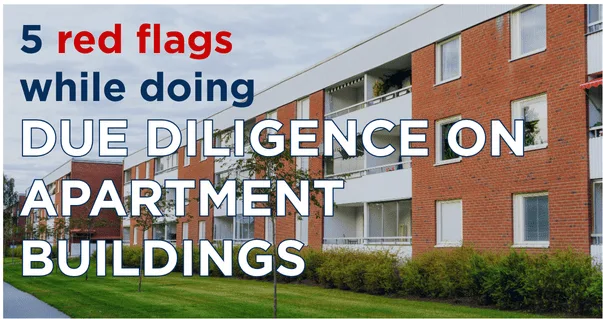I recently had a client who went under contract on what looked like a great deal. From the outside, everything seemed to check out. The building was in a good location, the rent numbers looked solid, and there weren’t any glaring issues. It seemed like this would be a smooth process.
But once they started digging into things during due diligence, they came to me with a long list of concerns. Some of them were legitimate. Others weren’t things they needed to worry about. But every single one of them was a good question. And that’s the whole point of due diligence – it’s your time to ask questions and uncover anything that could cause problems down the road.
Here are five things you should be watching out for when you’re doing due diligence on an apartment building.
1. Poor Quality Tenants
This one might not be obvious at first glance, but it’s a big one to watch out for.
Sellers know that occupied units look better than vacant ones. So, when they’re preparing to list a property, some owners may lower their standards just to fill a vacant unit and take on a tenant they normally wouldn’t approve.
They may also set the rent at the maximum price they think they can get, to make everything look better on paper. Ironically, that strategy sometimes attracts lower-quality tenants. If a renter is struggling to find housing elsewhere, they may be willing to pay more just to get in.
The risk here is that you can inherit tenants who create management problems or don’t pay consistently (or at all!)
2. Nonpayment of Rents
That brings us to the second red flag: nonpayment or late payments.
If you’re buying a building, you want to know that the income on paper is actually showing up in the bank. That means asking for a rent roll and a ledger showing rent collection over the past year. You need to look for patterns here. Does the rent come in on time every month? Are there late fees? Are tenants paying consistently, or are they skipping payments and making them up later?
A responsible owner should have already evicted tenants who were not paying rents, but that’s not always the case. Sometimes, tenants remain in place as they pay late one month, skip the next, and catch up the following month.
You want to see a stable payment history for all units, not just the original leases with expected numbers. That’s why reviewing a full rent ledger is a critical step.
3. Deferred Maintenance
Sellers want the building to look like a strong investment on paper – low expenses, high income. One way they try to improve the financial picture is by cutting maintenance expenses. This can make the net operating income look better on the short term, but can hide real issues that you will have to deal with once you purchase the property.
Typically, only one or two units are shown during the original walkthrough so the disruption to tenants is minimized. During due diligence, however, you can request a walk through every unit.
Some problems still might not be obvious on a walkthrough. But tenants often know what’s really going on. If you get the chance to speak with them, ask if they’ve put in maintenance requests recently and how those requests have been handled. You might hear things like “I asked to have the stove fixed three months ago and never heard back,” or “The plumbing has been acting up, and no one’s come to look at it.”
Even if the issues are small, they can add up. And they can tell you a lot about how the property has been managed.
4. Tenant Turnover
Tenant turnover is a normal and expected part of owning rental property. But it’s something you need to be aware of before you close.
If any tenants have given notice, the seller is supposed to inform you. Still, it doesn’t hurt to ask directly. This is especially important with month-to-month tenants. Just because someone is in place when you tour the building doesn’t mean they’ll still be there when you take over.
Ask whether any tenants are planning to move out soon. If you don’t, you could end up with a vacant unit or two right after closing – and that’s not something you want to be surprised by.
You also need to be aware of when leases expire. If most of the leases expire 2 months after you close, the seller may not have received notices yet, but you could end up with a lot of vacancies all at once.
Turnover also comes with costs, making it even more crucial to understand when to expect vacancies. Between cleaning, repairs, advertising, and leasing, the expense of an unexpected vacancy can quickly add up.
5. Legally Permissible Units
This can sink the whole ship if you miss it.
In some buildings – especially older ones – you’ll see units in areas like the basement or attic. We’ve even seen garages converted to units. Just because these units exist and are currently occupied doesn’t mean they’re legal.
You need to check with the local zoning and codes office to confirm that every unit in the building is legally permissible and that the property meets any inspection requirements.
Some municipalities require rental inspections every year or two. If those haven’t been done, or if the building doesn’t meet habitability standards, it can delay your ability to collect rent or even require you to vacate units until repairs are made.
It’s crucial to find this out during due diligence. Finding out after you’ve closed can result in a nasty surprise.
Conclusion
When you’re buying a property, due diligence is the time to slow down and look closely. Ask questions. Review the numbers. Talk to the tenants.
If you’re thorough in your analysis, you’ll avoid headaches and set yourself up for a smoother ownership experience after closing.
We take an active approach in guiding our clients through their due diligence, helping them uncover and understand potential issues. If you’re looking at apartment buildings in Pennsylvania and Maryland, contact us for a thorough investment analysis. We’re happy to help.





